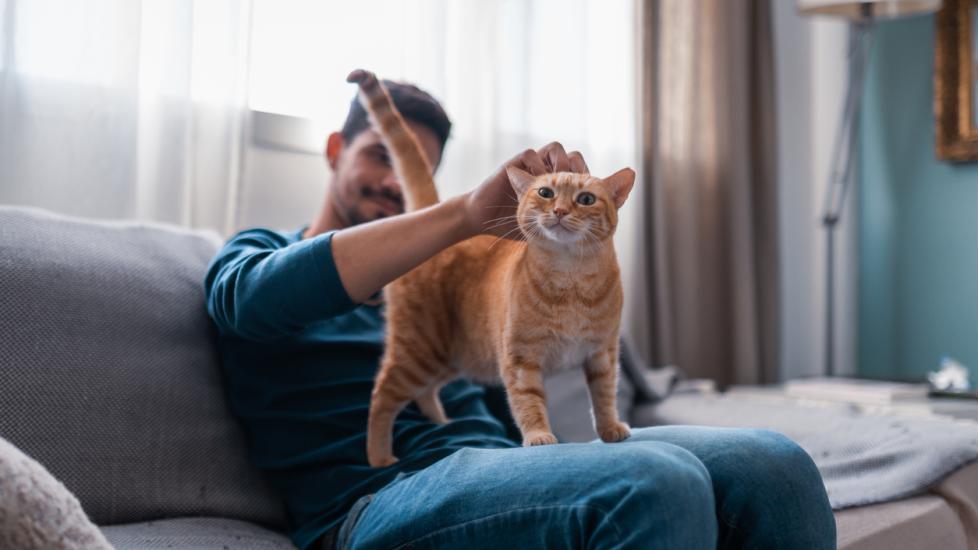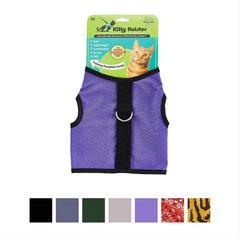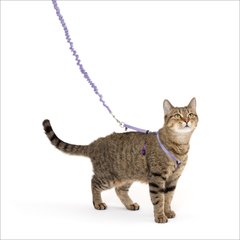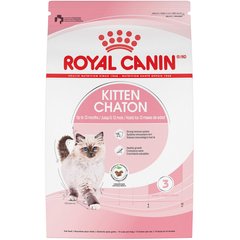How Long Do Cats Live? Here's What To Expect
iStock/Magui-rfajardo
Thanks to advances in feline medicine, nutrition, and care, our house cats are living longer, healthier lives. And it’s a pet parent’s responsibility to help their kitty reach those golden years by giving him proper care for each life stage.
So if you’ve ever found yourself wondering how old your cat is and how long cats live, the answer is largely dependent on how you and your vet work together to approach your cat’s nutrition, vaccination, oral health, and environmental needs as he grows.
Here’s everything you need to know about the average lifespan of cats and how to help your cat live longer.
Key Takeaways
- A cat's nutrition, preventive care, and even their spay/neuter status can impact how long they live.
- It's important to have a good relationship with your vet to ensure your cat is getting what they need for a long and healthy life.
- If you notice any changes in your cat's behavior as they age, chat with your vet.
What’s the Average Lifespan of a Cat?
The average cat lifespan is between 13–17 years. Some lucky felines have been known to live 20 years or more—the world record holder for oldest cat on record, adorably named Creme Puff, lived to be a whopping 38 years old.
Many factors contribute to how long a cat will live. These include:
-
Nutrition. A complete and balanced diet provides your cat with the nutrients, vitamins, and minerals they need to promote good organ function, a strong immune system, and an ideal body weight.
-
Lifestyle. A cat’s lifestyle will directly impact their lifespan. Indoor cats tend to outlive outdoor cats simply because they aren’t exposed to harsh environmental factors and have access to routine preventive care, thanks to their pet parent.
-
Preventive care. Cats who are fully vaccinated and have routine blood work will be treated for health issues quicker. Cats who are on regular preventive medication like those for fleas, ticks and heartworm live longer since they won’t fall ill to diseases triggered by parasites.
-
Breed. Some cat breeds live longer than others, such as a Siamese compared to a Maine Coon. Siamese tend to have fewer health concerns and thus live longer, while the Maine Coon, a larger cat in stature, is predisposed to health issues due to their size.
-
Mixed breed cats will often live longer lives than purebred cats due to hybrid vigor. When two genetically different cat breeds mate and have kittens, they tend to be healthier with fewer genetic issues.
-
While tabby cats are not an actual breed but rather a type of fur pattern, their average lifespan can be an impressive 15–20 years.
-
-
Genetics. A cat’s genetics and their predisposition to certain conditions and diseases can cause a shorter lifespan. Genetic testing should always be done before breeding two cats.
-
Spaying/Neutering. Cats who are spayed or neutered can live longer lives than those that are left intact. A cat’s development of reproduction-related cancers is much higher in unspayed cats due to an excess in circulating hormones.
Life Expectancy of Outdoor Cats vs. Indoor Cats
Unfortunately, the lifespan of outdoor cats or cats with lots of outdoor access is on average only about half of that for indoor cats. Outdoor cats face many dangers including:
-
Infectious disease (from wildlife or other cats)
-
Trauma (from predators or vehicles)
-
Parasites (fleas, ticks, or intestinal parasites)
Though some cats will benefit emotionally and behaviorally from supervised outdoor activities such as walking on a leash or exploring outdoor enclosures, most cats can be very happy as indoor-only pets in a properly enriched environment.
For the lifespan of house cats or indoor-only cats, they typically benefit from longer lifespans since they are protected from the most common dangers and are typically provided well-rounded nutrition.
Cat Life Stages
As your cat ages, he goes through different life stages that affect his behavior and health needs.
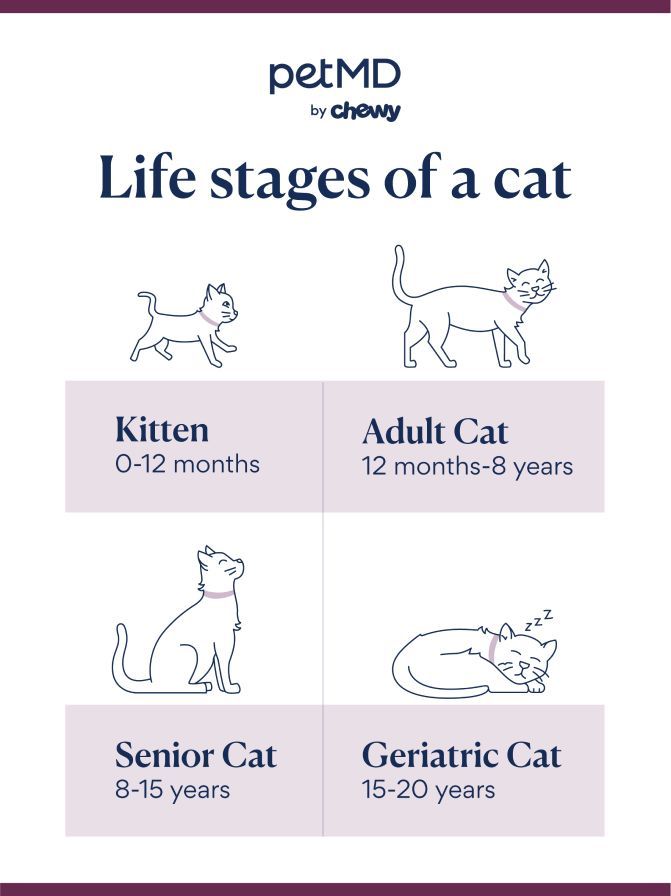
Kitten (Birth to 1 Year)
A kitten’s job is to grow and to learn how to interact with his environment. This young, playful life stage is incredibly important for setting your cat up for success.
Though most kittens learn bathroom and feeding habits without much help, it’s also important to socialize kittens and engage in appropriate enrichment play to set them up for behavioral success.
A cat laser pointer is a great way to work those active kitty minds and get your cat moving at the same time.
It’s important that kittens are fed a diet specifically formulated for growth, as they have higher caloric needs at this age to help them grow big and strong.
Appropriate diets will have an Association of American Feed Control Officials nutritional adequacy statement on the label stating a diet must provide “complete nutrition for growing kittens.”
Kittenhood is also the time when their immune system is introduced to protective vaccines, such as FVRCP, rabies, and the FeLV vaccine. Older kittens should be spayed or neutered around 6 months of age to reduce the risk of certain cancers and behavioral issues such as urine marking or spraying.
Young Adult (1–6 years)
Young adult cats are still very active and playful, but they are no longer growing physically.
They have reduced calorie needs and should be eating adult cat food at this time. Careful management of their weight will reduce the likelihood of future health conditions such as arthritis or diabetes.
It’s important to keep cats up to date on their vaccines and routine examinations, even though this age group is relatively resistant to illness. That said, certain diseases such as asthma and feline lower urinary tract disease (FLUTD) are more commonly diagnosed at this age.
Catching these issues early can lead to much more successful long-term management, and baseline blood work can help establish normal values to compare to as your cat ages.
Mature Adult (6–10 years)
Mature adult cats may start slowing down; they won’t play as often and can move into a more sedentary lifestyle.
Changes in behavior may be noted regarding litter box use and nighttime activity levels. For example, some older cats will become more active late at night and then sleep more during the day.
Or cats that were once fastidious about their bathroom habits may no longer cover their poop or may go outside the litter box.
You can invest in an uncovered litterbox with a very low side for your senior cat to help them easily get in and out of their litter box, especially if they have mobility issues.
These issues can be related to arthritis, cognitive dysfunction, or even early kidney or digestive issues. Mature cats should have routine bloodwork done every year to monitor for early changes in the kidneys, liver, or thyroid.
Pet parents need to monitor grooming behavior, hairballs, and weight changes closely. Attention should be paid to oral health and dental cleanings should be considered at this age at the discretion of your veterinarian, especially in cats resistant to routine tooth-brushing.
Finding a pet toothbrush and toothpaste that work for your cat is ideal to help lower the need for frequent dental cleanings and to invest in your cat’s oral health consistently—if you can get them to cooperate.
Senior (10+ years)
The transition from mature adult to senior cat can vary depending on the cat. Some cats in this age range will remain spry and mobile for years, while others will have more illnesses.
It’s commonly recommended for cats 10 years and older to have blood work and urine testing done every six months, as organ health can change quickly. Older cats are also prone to blood pressure issues, which can lead to strokes and blindness. Blood pressure can be easily monitored at your cat’s annual checkup.
Senior cats often slow down more than they did as a mature adult, which can be a sign of untreated arthritis pain. If your cat isn’t already on a joint supplement, your vet can also recommend adding one like Nutramax’s Cosequin for Cats to help promote strong joint health.
How To Increase Your Cat’s Lifespan
While we all wish there could be a magic elixir to make our cats live forever, some illnesses are unavoidable and there’s no way to cheat death. But there are quite a few things pet parents can do to help a cat live longer:
-
Stay up to date on vaccines. Vaccines targeted for your cat’s lifestyle are imperative in preventing some diseases that are difficult or impossible to treat. It’s important to remember that indoor cats need their vaccinations too.
-
Spay/neuter at a young age. Cats that are not spayed or neutered have a much higher likelihood to have a life-threatening reproductive disease and cancer at a young age.
-
Keep up with preventative care. Cats are good at hiding symptoms of illness, so annual checkups with your vet and routine blood testing can go a long way to detecting issues early on. The better relationship your vet has with your cat, the more likely they will be able to key in to changes during an exam. Be sure to discuss any change in your cat’s behavior, even if it seems minor.
-
Update your cat’s environment. As cats age it’s important to adapt to their needs. Chat with your vet about whether joint supplements would be beneficial for your cat’s joints if they you’ve noticed that your cat is slowing down. You may want to get them an orthopedic bed so they have much-needed cushion support.
- Monitor your cat’s weight and feed a complete balanced diet. There are many life-limiting issues caused by obesity in cats, including severe arthritis and diabetes. Ensuring your cat is eating a well-balanced diet appropriate for this life stage is extremely important. Feed your cat in measured amounts (meal feeding is best, especially for multi-cat households) so you can adjust intake to fit their individual metabolism.
